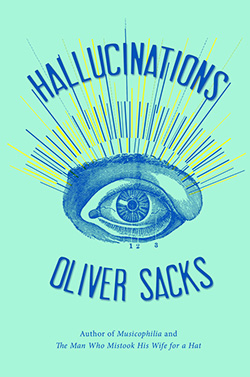Hallucinations (book)
Hallucinations is a book written by the renowned neurologist Oliver Sacks. Published in 2012, it explores the fascinating world of hallucinations, delving into the various forms and causes of this complex phenomenon. Sacks, known for his detailed case studies and ability to humanize medical conditions, uses a combination of scientific analysis, historical context, and personal narratives to provide a comprehensive overview of hallucinations.
Overview[edit | edit source]
The book is divided into several chapters, each focusing on a different type of hallucination. Sacks discusses visual, auditory, tactile, and olfactory hallucinations, among others, providing insights into how they are experienced by individuals. He draws on a wide range of sources, including his own patients, historical cases, and scientific research, to illustrate the myriad ways in which the brain can generate these false perceptions.
One of the key themes of Hallucinations is the idea that hallucinations are not merely a symptom of mental illness but can also occur in people who are otherwise healthy. Sacks explores the various conditions and circumstances that can lead to hallucinations, including sensory deprivation, neurological disorders, and the use of psychoactive drugs. He also examines the role of hallucinations in different cultures and historical periods, showing how they have been interpreted in various ways, from spiritual visions to signs of madness.
Critical Reception[edit | edit source]
Hallucinations received widespread acclaim for its insightful and compassionate approach to a subject that is often misunderstood. Critics praised Sacks for his ability to blend scientific rigor with empathetic storytelling, making complex medical concepts accessible to a general audience. The book was also noted for challenging the stigma associated with hallucinations, encouraging a more nuanced understanding of the human brain and its capacity for extraordinary experiences.
Impact[edit | edit source]
Hallucinations has contributed significantly to public and professional discourse on the nature of hallucinations and their implications for understanding consciousness and the human mind. It has been used as a resource in various fields, including psychology, neuroscience, and the arts, to explore the boundaries between perception and reality. Sacks's work has also provided comfort and validation to individuals who have experienced hallucinations, offering them a sense of connection and a broader context for their experiences.
See Also[edit | edit source]
Navigation: Wellness - Encyclopedia - Health topics - Disease Index - Drugs - World Directory - Gray's Anatomy - Keto diet - Recipes
Search WikiMD
Ad.Tired of being Overweight? Try W8MD's physician weight loss program.
Semaglutide (Ozempic / Wegovy and Tirzepatide (Mounjaro / Zepbound) available.
Advertise on WikiMD
WikiMD is not a substitute for professional medical advice. See full disclaimer.
Credits:Most images are courtesy of Wikimedia commons, and templates Wikipedia, licensed under CC BY SA or similar.Contributors: Prab R. Tumpati, MD

